- Rasmussen University is dedicated to serving our communities by recognizing the diverse needs of individuals. We encourage personal and professional development through respect, appreciation, and a commitment to general education as a foundation for life-long learning. As an institution of higher learning, the College is committed to preparing students to be active, productive and successful contributors to a global community.
School Highlights
Rasmussen University-Minnesota serves 8,498 students (42% of students are full-time).
The college's student:teacher ratio of 19:1 is lower than the state community college average of 22:1.
Minority enrollment is 56% of the student body (majority Black), which is more than the state average of 42%.
Quick Stats (2025)
- Enrollment: 8,498 students
- Private-state tuition: $10,764
- Acceptance Rate: 88%
- Student:teacher ratio: 19:1
- Minority enrollment: 56%
- Source: Integrated Postsecondary Education Data System (IPEDS)
Top Rankings
Rasmussen University-Minnesota ranks among the top 20% of public schools in Minnesota for:
School Overview
The teacher population of 443 teachers has stayed relatively flat over five years.
Rasmussen University-Minnesota
(MN) Community College Avg.
Carnegie Classification
Baccalaureate/Associate's Colleges: Mixed Baccalaureate/Associate's
Associate's Colleges: Mixed Transfer/Career & Technical-Mixed Traditional/Nontraditional
Institution Level
Four or more years
At least 2 but less than 4 years
Institution Control
Private for-profit
Public
Total Faculty
443 staff
153 staff
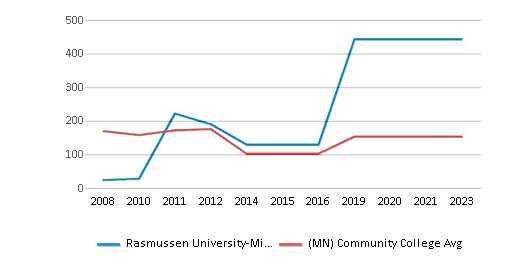
School Calendar
Student Body
The student population of Rasmussen University-Minnesota has grown by 114% over five years.
The student:teacher ratio of 19:1 has increased from 9:1 over five years.
The Rasmussen University-Minnesota diversity score of 0.72 is more than the state average of 0.63. The school's diversity has grown by 5% over five years.
Total Enrollment
8,498 students
2,555 students
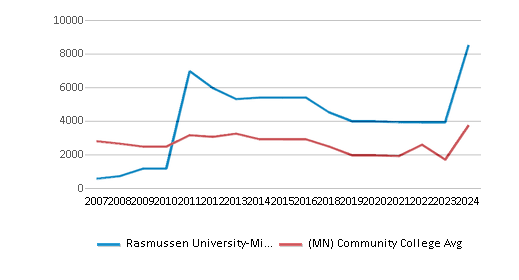
Student : Teacher Ratio
19:1
22:1
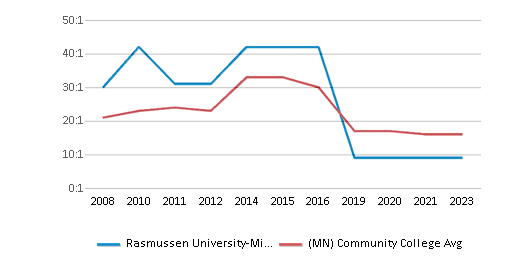
# Full-Time Students
3,581 students
915 students
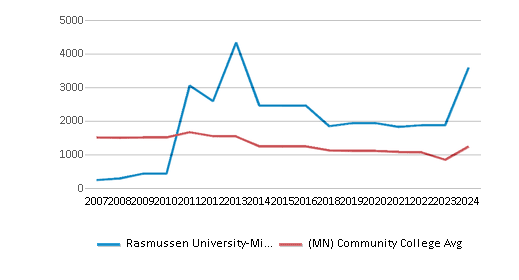
# Part-Time Students
4,917 students
1,808 students
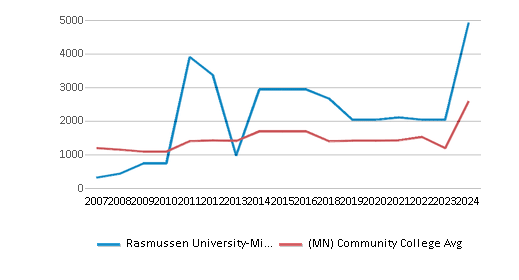
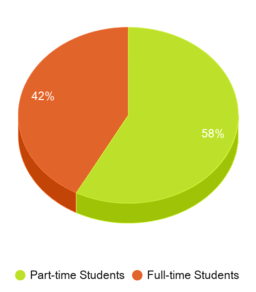
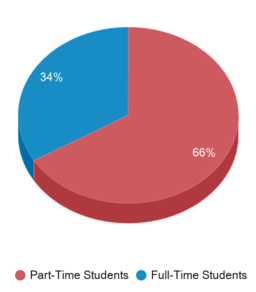
# Enrollment Undergraduate
723 students
372 students
# Full-Time Undergraduate Students
2,793 students
842 students
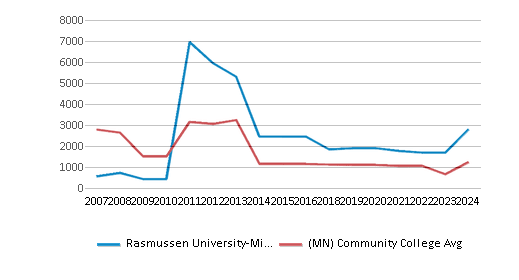
# Full-Time Graduate Students
788 students
38 students
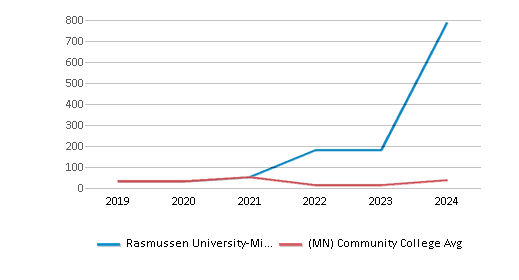
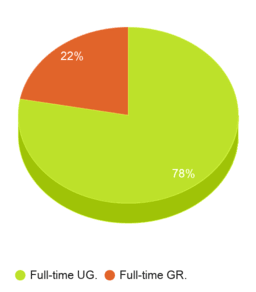
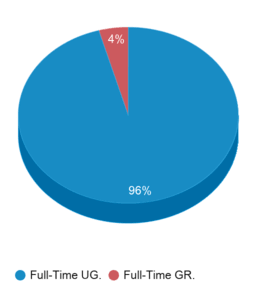
# Part-Time Undergraduate Students
4,442 students
1,771 students
# Part-Time Graduate Students
475 students
12 students
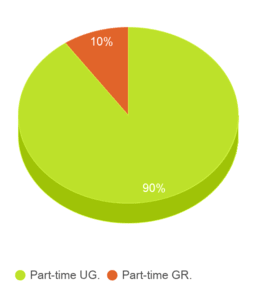
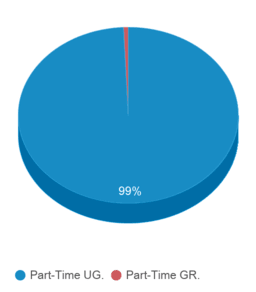
Total Dormitory Capacity
n/a
116 students
% American Indian/Alaskan
1%
1%
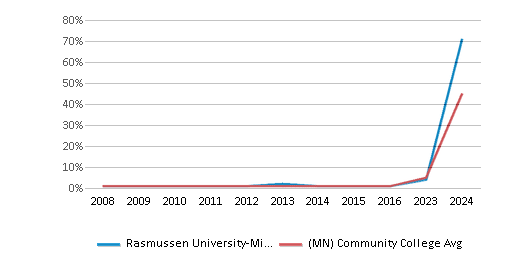
% Asian
4%
6%
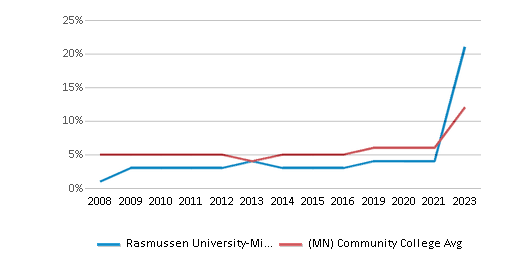
% Hispanic
9%
8%
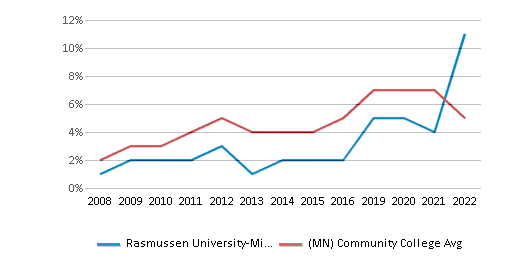
% Black
27%
15%
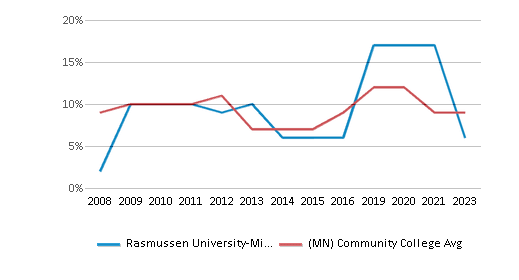
% White
44%
58%
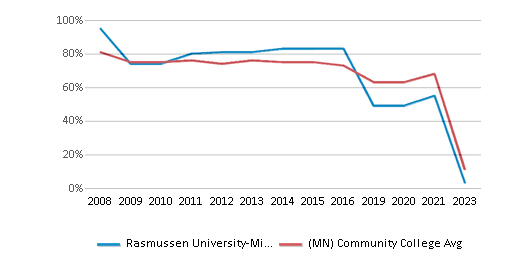
% Hawaiian
n/a
1%
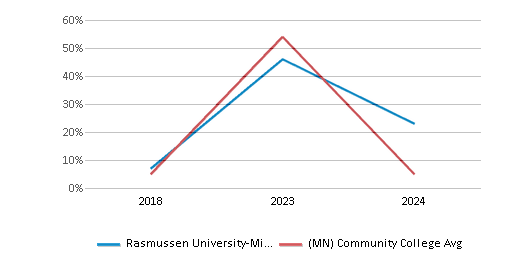
% Two or more races
2%
4%
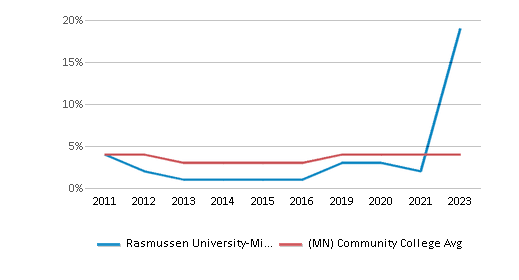
% Non Resident races
n/a
1%
% Unknown races
12%
6%
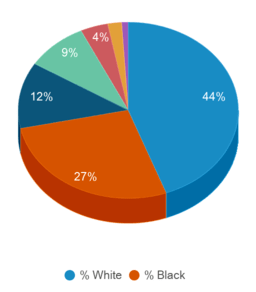
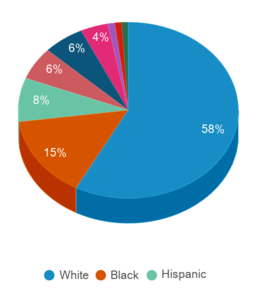
Diversity Score
0.72
0.63
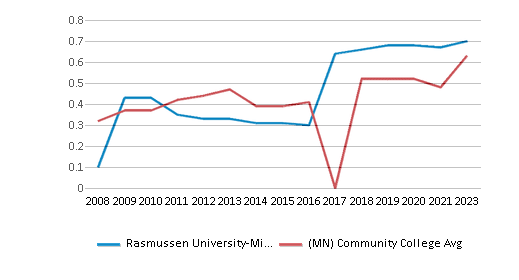
College Completion Rate (Students who graduate in less than 4 years)
n/a
0.3421%
College Completion Rate (Students who graduate in 4 years or more than 4 years)
0.4847%
0.5652%
Average Graduate Earnings (10 Years)
$33,100
$36,900
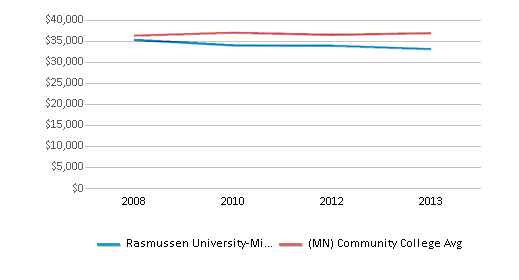
Tuition and Acceptance Rate
The private state tuition of $10,764 is less than the state average of $17,208. The private state tuition has declined by 12% over four years.
Private State Tuition Fees
$10,764
$17,208
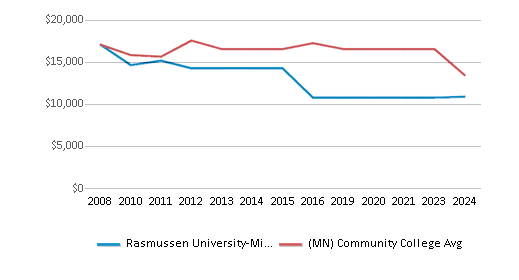
% Students Receiving Some Financial Aid
96%
89%
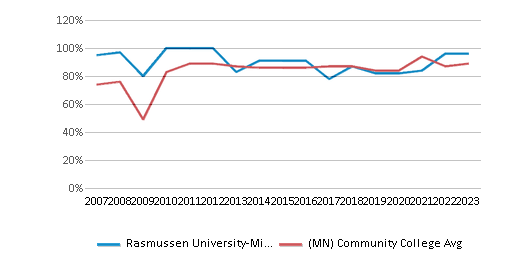
Median Debt for Graduates
$20,000
$12,264
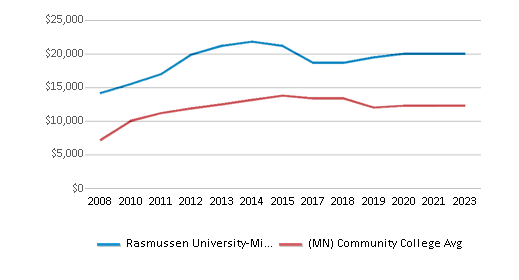
Median Debt for Dropouts
$6,332
$6,747
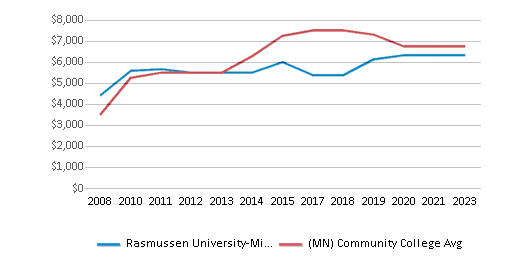
Acceptance Rate
88%
78%
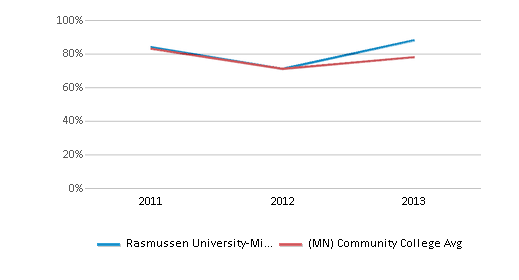
SAT Reading
n/a
625
SAT Math
n/a
600
SAT Writing
n/a
565
ACT Composite
n/a
24
ACT English
n/a
24
ACT Math
n/a
23
ACT Writing
n/a
8
Source: 2024 (or latest year available) Integrated Postsecondary Education Data System (IPEDS)
School Notes
- Rasmussen University is a private, for profit, two-year degree granting College with campuses in Brooklyn Park, Eagan, Mankato, Minnetonka, St. Cloud and an Online Division. Rasmussen University was founded in 1900 by Walter Rasmussen. The College offers day, evening, and online classes and awards Associate of Applied Science (AAS) degrees as well as diplomas and certificates in a variety of career areas. Rasmussen University specializes in career-focused training designed to provide you with maximum job placement potential. A Rasmussen University education is personalized, technology-intensive, focused, and innovative. You can graduate in as little as 9-months or earn a two-year degree. Rasmussen University is a leader in career education for one reason – our people. Our success depends on hiring the right people; creative people who deliver exceptional student services, inspired classroom instruction, and innovative operational management. Rasmussen University is accredited by The Higher Learning Commission of the North Central Association of Colleges & Schools (NCA).
Frequently Asked Questions
How much does Rasmussen University-Minnesota cost?
Rasmussen University-Minnesota's private state tuition is approximately $10,764.
What is the acceptance rate of Rasmussen University-Minnesota?
The acceptance rate of Rasmussen University-Minnesota is 88%, which is higher than the state average of 78%.
What is Rasmussen University-Minnesota's ranking?
Rasmussen University-Minnesota ranks among the top 20% of community college in Minnesota for: Diversity in US community colleges and Largest student body.
Recent Articles

Obtaining Your Bachelor's Degree at a Community College
Explore the evolving landscape of community colleges offering bachelor's degrees, addressing affordability, accessibility, and workforce needs.

A to Z of Community College Certificates and Courses
From business and healthcare to technology and skilled trades, the article showcases the breadth of options available to students seeking to enhance their knowledge, develop new skills, or pursue career advancement.

What is a Community College?
This comprehensive guide explains what a community college is, its history, and its role in higher education. It covers the types of programs offered, differences from four-year colleges, benefits of attending, and important considerations for prospective students, providing valuable insights for those exploring educational options.






